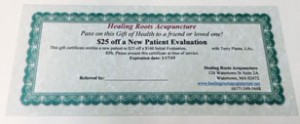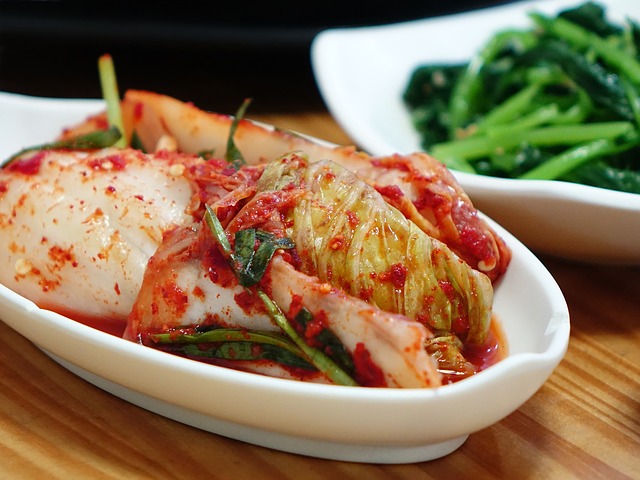-
 Healing Roots Acupuncture60 Austin Street, Suite 302
Healing Roots Acupuncture60 Austin Street, Suite 302
Newtonville, MA 02460617-549-5648 GIVE A GIFT THAT PROMOTES HEALTH AND WELL-BEING
Gift Certificates from Healing Roots Acupuncture are perfect for people new to wellness and seasoned wellness enthusiasts alike!

Complimentary Wellness Workshops:
Topic: 3 Significant Stressors Most practitioners miss and we can help.
This workshop has information for those who are interested in RIFE.
What happens when the blood tests comes back negative, the medication doesn't work, and your on a waiting list for yet another doctor, and in the meantime, you continue to feel the daily pain and inflammation, and perhaps your symptoms are getting worse and you have no one on your team who you feel confident they can help you to get relief?
Anyone who is interested is welcome to attend with no obligation
7PM each month, right here in our office
- Next workshop: TBA
Call to RSVP today at 617-549-5648
Traditional Chinese Medicine
Five Acupuncture Points for Spring

Spring is the season of growth, regeneration, increased activity and new beginnings. During the season of spring, people experience many changes. Allergies, high blood pressure, headaches, sinus pain and congestion, anger, irritation and tendon problems are just some of the issues common to the spring months. Many of these problems can be attributed to increased wind in the environment. And while there is nothing that can be done about external wind, internal wind can be addressed and diminished using Traditional Chinese Medicine (TCM) and the many modalities it incorporates. continue reading
Mental/Emotional Aspects of The Heart

The major responsibility of the heart in TCM is housing the mind and controlling the shen. “Shen” can be seen as the overall healthiness of the mind. When you look at a healthy person in good spirits, you know how you can see that in their eyes? There is a certain bright clarity and sense of health that shines from within. We acupuncturists would say that this person has good shen. continue reading
Physical Aspects of The Heart
 In Traditional Chinese Medicine, the heart is the organ most closely linked to emotion. Think about all the terms we use every day to describe our state of mind: “heartsick,” “heartbroken,” “heartache” The heart is not the director of subtlety; the emotions it encompasses seem to always be on the far end of the spectrum, either extreme sadness or extreme joy. continue reading
In Traditional Chinese Medicine, the heart is the organ most closely linked to emotion. Think about all the terms we use every day to describe our state of mind: “heartsick,” “heartbroken,” “heartache” The heart is not the director of subtlety; the emotions it encompasses seem to always be on the far end of the spectrum, either extreme sadness or extreme joy. continue reading
Why am I so cold?

Everyone feels cold sometimes, but some people are perpetually chilled to a point where it interferes with their lives.
From a Traditional Chinese Medicine perspective, there are two different kinds of cold in the body: full cold and empty cold. Full cold refers to a condition where there is an excess of cold-type energy in the body leading to a feeling of cold, and most likely other health problems, as well. The other kind of cold is empty cold. This means there is not an abundance of cold energy but rather a weakness of the warm fiery energy. When there isn’t enough warmth in the body, you will feel cold – not because the cold is so strong, but because you don’t have enough fire to balance it out.
Full cold
As mentioned, a full cold condition refers to an over-abundance of cold type energy in the body. This is often an acute case and may relate to being outside on cold weather, or exposing a certain area of your body to cold water, cold wind or cold weather. Symptoms really depend on the location of the cold in the body.
For instance, you might feel really cold when you are coming down with a cold virus. From a TCM perspective, this is cold being trapped under the skin or in certain channels on the back of the neck. Other associated symptoms may be a stiff neck, a runny nose or an occipital headache.
Full cold can also lodge itself in the digestive system – this may happen following a meal of cold food, drinking cold beverages in a cold environment or following exposure to very cold temperatures. Full cold in the digestive system can lead to a feeling of cold, as well as painful cramping, diarrhea or loose stools and pain in the abdomen.
Another common site of a full-cold condition is the uterus. This can be from exposure to cold temperatures such as swimming in cold water or sitting on a cold surface. Certain gynecological procedures can also introduce cold into the uterus. This type of cold manifests as a feeling of cold, particularly with the period and very painful cramping before and during the period. There will likely also be clots and possible problems with fertility.
All of these full-cold conditions can be avoided by limiting exposure to cold environments and cold foods. Also introducing heat internally through teas, soups and warming herbs can help.
Empty cold
In TCM, health is a state of balance between yin and yang. Yin refers to the cool, watery, passive parts of our physiology, whereas yang refers to the hot, fiery, active parts. When the yang energy is weakened, there isn’t enough fire to balance out the cool and watery yin. This leads to a pervasive feeling of cold that is hard to shake, even with lots of blankets and warm drinks. This is someone who always feels chilled, no matter what. There may be other symptoms, as well, such as loose stools, a lack of energy or motivation, wanting to sleep all the time or fluid accumulation. Yang deficiency cold often requires use of herbal medicine, acupuncture, and moxa to treat appropriately.
While these are the main reasons for feeling cold, there are two other energetic imbalances that can also lead to feeling cold – Qi stagnation and blood deficiency. When Qi is stuck, circulation is impaired and heat can’t get to our extremities effectively. This kind of cold often manifests as very cold hands and feet. It can be helped by regular exercise, reducing stress and limiting heavy foods. A weakness in the blood energy of the body leads to a low-grade constant feeling of cold less severe than a yang deficiency cold, but still pervasive and consistent. It can be helped with getting enough sleep, reducing stressors and eating a well-balanced diet of blood-nourishing foods.
The Bladder in Chinese Medicine
In Traditional Chinese Medicine, the bladder is one of the six yang organs, paired with one of the six yin organs. The yin organs store vital substances (such as Qi, blood, yin, and yang), whereas the yang organs are more active and have a function of constantly filling and emptying. The bladder is a perfect example of a yang organ. Its main physiological function is to remove water from the body in the form of urine. To do this, the bladder uses Qi (energy) and heat from its paired yin organ, the kidneys. continue reading
Successful Tonics to Boost the Kidneys
The kidneys in Traditional Chinese Medicine are a vital energy system. They are the root of all yin and yang in the body, and they store our essence. They govern growth, reproduction and healthy progression through the different cycles of life. They play a role in healthy aging and preventing lots of age-related decline. They also control the bones, the low back and the knees. On a mental-emotional level, the kidneys are associated with fear – an imbalance in the kidney energy often leads to irrational or pervasive fear. On a spiritual level, the kidneys are the source of our Zhi, or will-power – our drive to succeed, to thrive and to be alive. continue reading
Building Protective Qi with TCM
Everybody gets sick at some point in their life. For some, it’s just a quick weekend thing. For others, it can last for several days and even weeks. Why do some people always get sick whenever there is a bug going around and others don’t? It all comes down to immunity. People who have a stronger immune system, tend to be sick less often. Those with compromised or weak immune systems, seem to get sick at the drop of a hat. There are many things that can be done to strengthen the immune system though. And Traditional Chinese Medicine is probably one of the best and least invasive ways to boost the immune system, not just during the winter months, but all year long. continue reading
Five Ways to Increase White Blood Cell Count with TCM
Leukopenia is a term used when there are less than adequate white blood cells in the bloodstream. This condition may make those suffering from it susceptible to infections. Leukopenia is often seen in diseases such as AIDS, cancer and lupus, as well as in common occurrences like the flu or a cold. Leukopenia can also be medically induced, as is often the case for cancer patients undergoing chemotherapy and radiation. While there are several prescription medications available to battle this condition, most of them also have multiple adverse side effects. But there are alternative natural methods that can increase white blood cell count without the side effects. One of these is Traditional Chinese Medicine. continue reading
Ssshhhh: Organ Sound Vibration
Did you know shushing someone might actually may be beneficial to your health? There are six healing sounds known to Taoist qi gong practice that vibrate specific organs and promote emotional and physical well-being.
It has been shown sound vibrations promote healing and provide a type of massage to the organs. Six main organs that benefit from this sound vibration include the liver, heart, spleen, lungs, kidneys and triple burner. These are known as yin organs in Traditional Chinese Medicine and are associated with wood, fire, earth, metal and water. The key to vibrational healing is a relaxed attention to the organ to release stuck energy and emotion. It is not even necessary to voice the sounds; a whisper will do or even a mental rendition of the sound. There are many methods of qi gong practice for sound healing. You can explore more on YouTube or seek a qi gong teacher for more specific practice. continue reading
Fermented Foods and Intestinal Health
 The modern world is changing every single day. Because of this constant state of change, our bodies are frequently having to adjust. We have a food supply being degraded and depleted of nutritional content, which in turn, causes our bodies to become depleted. Our soil and water is contaminated with antibiotics and deadly fertilizers. All of which become part of the food chain we rely upon. Because of this, antibiotics are failing and superbugs like MRSA are on the rise. Lack of nutrition and the overuse of antibiotics are just a couple of the things wreaking havoc on our intestinal health. But there are ways to combat this and keep the gut healthy. continue reading
The modern world is changing every single day. Because of this constant state of change, our bodies are frequently having to adjust. We have a food supply being degraded and depleted of nutritional content, which in turn, causes our bodies to become depleted. Our soil and water is contaminated with antibiotics and deadly fertilizers. All of which become part of the food chain we rely upon. Because of this, antibiotics are failing and superbugs like MRSA are on the rise. Lack of nutrition and the overuse of antibiotics are just a couple of the things wreaking havoc on our intestinal health. But there are ways to combat this and keep the gut healthy. continue reading

